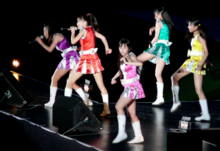Junior idol
Unlike other child models, idols are commercialized through merchandise and endorsements by talent agencies, while maintaining an emotional connection with a passionate consumer fan base.
[8] The majority of junior idols belong to specialized talent agencies, some of which offer acting and voice training and are geared towards the production of television commercials, photobooks, and related materials.
Though sources indicate revenue is relatively low for photographic models, a number of idols (and their parents) see this activity as a gateway to more mainstream media roles.
[12] The trend of junior idols dates back to the mid-1990s, a period marked by significant increase in the number of child models and works involving individuals in that age range.
Concerning the contents of the titles put on sale, these include, in general terms, pictures or footage of the idols trying out a variety of outfits, such as school uniforms, bathing suits, gym clothes, yukata or even maid, police and anime-inspired costumes.
Some services providers, such as Imouto Club (清純いもうと倶楽部, Seijun Imōto Kurabu)—a subscription-based website—also feature short radio and movie dramas, available for download and later purchase on DVD.
[18] On October 16, 2007, the Tokyo Metropolitan Police Department arrested four individuals, including the Chief Producer of the video production company Shinkosha, on suspicion of violating the Child Pornography Prohibition Act.
[19] This has increased the possibility that filming minors in swimsuits and other forms of appearance using conventional methods will fall under the definition of child pornography, and has caused some companies selling images of junior idols to pull out of the business.
